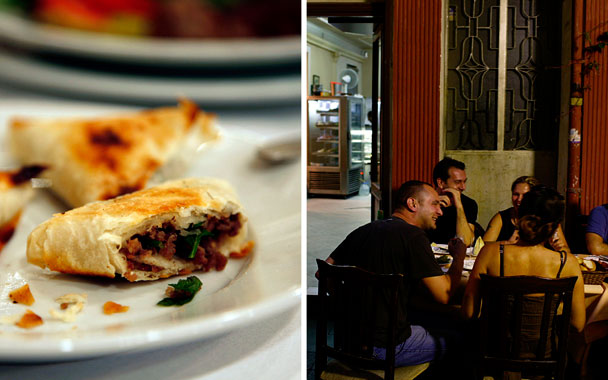When my parents came to visit me in Istanbul in the 1980s, they took one look at the tiny apartment I was sharing with another student and insisted that we go out for dinner. The conversation with my mother went something like this:
“Where are we eating tonight?”
“Well, what kind of food do you want?” I asked. “Meat? Fish? Something with sauce?”
Mother, irritably: “I want to sit in the restaurant, look at the menu, and then decide.”
“Sorry, but you have to decide now. Each type of food has its own restaurant.”
“Okay, something with gravy.”
Duly instructed, I led them to my favorite lokanta.
“I’d like a beer,” my father announced when we had settled in.
“Sorry, the lokanta doesn’t serve alcohol.”
Despite the proliferation of foreign-style restaurants and chains in Istanbul, most Turks still insist on maintaining the authenticity not only of their food but of the entire eating experience. This can be confusing to the newcomer, but with even a little knowledge you will find the city a culinary paradise—which makes sense given that, as the capital of two successive empires and the cultural capital of the modern Turkish Republic, it has been the site of serious eating for thousands of years. The foods and customs of Istanbul’s traditional restaurants are also a window onto the tug-of-war between religion and secularism that permeates Turkish society. What is eaten where, and how, is not a casual matter here.
Alcohol, not surprisingly, is a primary indicator of a restaurant’s place in the social fabric. Those that serve wine and beer, in particular, are associated with Istanbul’s diverse ethnic and religious history and with today’s urban secular elites; those that don’t cater to the pious Muslim part of the population. This demarcates a fault line in Turkish politics and society so deep that some secularists won’t dine in a place that doesn’t serve drinks, and the pious won’t enter a restaurant that does. You can spot the difference right away by the presence or absence of women in head scarves. Lunch is less ideological than dinner—something like the Christmas Truce of 1914, when British and German soldiers shared cigarettes and a song in no-man’s-land before returning to their trenches.
In Ottoman times, Greeks (called Rum, a corruption of Rome) and other Christians were the merchants and tavern keepers, while Muslims kept to the barracks and the bureaucracy. The prominence of hard-drinking Christians in the city’s culinary history is reflected today in the meyhane (literally, “wine house”), an emblematic urban dining locale that serves primarily fish and raki, a clear anise-flavored alcohol that, with the addition of a splash of water, turns into white “lion’s milk,” drunk throughout the meal as other cultures drink wine. Dining on fish while drinking alcohol is the quintessential hallmark of being urban and secular.
The custom in meyhaneler is to first choose from a variety of cold appetizers (mezes) displayed on an enormous tray, then hot appetizers, followed by a fish, then fruit. In a precise culinary pas de deux, the classic meyhane starter is sweet melon with tart white cheese, followed immediately by raki with a water chaser. The variety of other mezes is endless but usually includes seasonal vegetables in olive oil or yogurt, morsels of seafood, bean pâtés, hot pockets of cheese in flaky pastry, calamari, and spiced liver.
There is no more classic meyhane than Refik, located in Beyog˘lu, Istanbul’s vibrant nightlife district. The food here is delicious—the grilled “Albanian liver” sprinkled with tangy spring onions and the börek (savory grilled pastries stuffed with cheese or minced lamb) are particularly good—but even more important is the atmosphere. For more than half a century, owner Refik Arslan, now 85, has overseen the nightly transubstantiation of food, drink, and fellowship into keyif, a condition that British explorer Sir Richard Burton once described as a feeling of intoxication derived from a social state of connection.



 Pinterest
Pinterest






